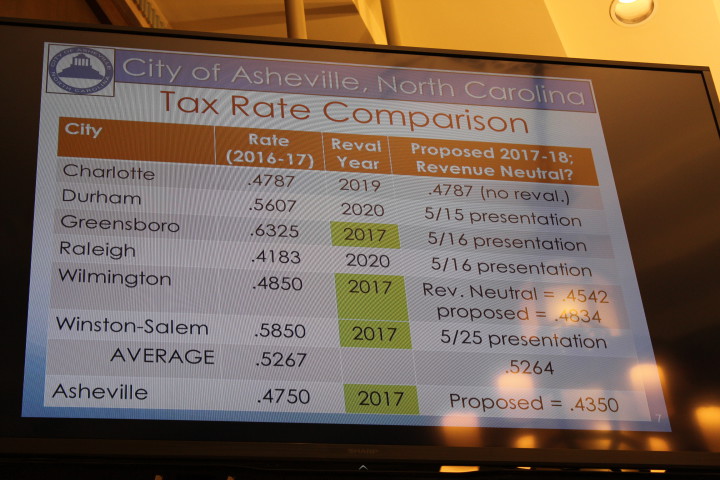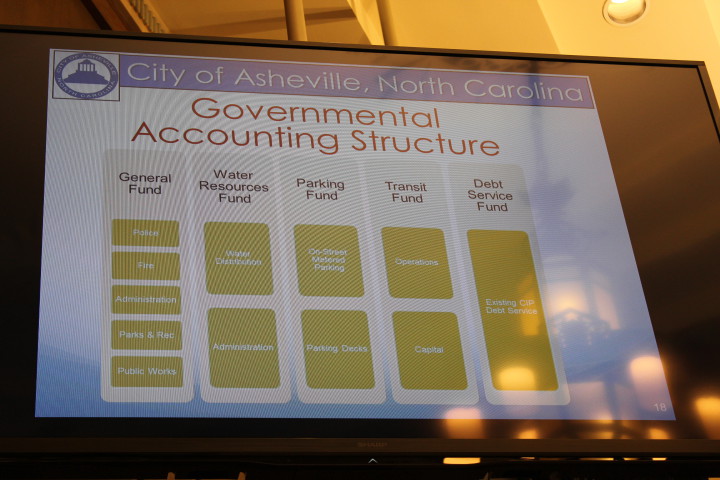City Manager Gary Jackson told members of Asheville City Council on May 9 that 85 new hiring requests and $11 million in city spending “are on the cutting-room floor” in the wake of his proposed 2017-18 fiscal year budget. But Jackson agreed to do more trimming in response to Council’s request to achieve a revenue-neutral tax rate plus a 3.5-cent increase to pay for debt service on the $74 million bond referendum passed by voters in 2015.
When the budget returns to Council at the body’s May 23 meeting, Jackson said, “I think you’ll find the response that we give you to be on target.” Based on the possible reductions discussed by Council, achieving that target could involve trimming the costs associated with changing to a new structure for the management contract for the city’s transit system or slowing down the timetable for a new downtown policing unit.
City Chief Financial Officer Barbara Whitehorn outlined the proposed $176 million budget. Following a 2017 property revaluation, she explained, the total taxable value of real estate in the city rose nearly 30 percent. Those higher property values mean that the tax rate needed to finance the same level of city services — that is, the revenue-neutral rate — will be lower than in 2016. The revenue-neutral rate, she said, is 39.5 cents, down from 47.5 cents per $100 of taxable property value in 2016.
Asheville Mayor Esther Manheimer noted that, to get to the current budget proposal, “We built in the bonds, because the voters approved the bonds.” With the additional 3.5 cents to cover interest on the bond funding, Asheville’s tax rate would be 43 cents per $100.
Whitehorn showed a comparison of other North Carolina municipalities’ current and proposed 2017 tax rates. The average rate for Charlotte, Durham, Greensboro, Raleigh, Wilmington and Winston-Salem in 2016, she said, was 53 cents. Where Asheville is “a real outlier,” she said, is in the city’s growth in real estate valuation, noting that the other cities are seeing growth of around 5 percent versus Asheville’s nearly 30 percent.

Manheimer asked Jackson to retain about $600,000 budgeted for enhancements to the city’s transit service while eliminating an additional half-cent tax the city manager had proposed to pay for those improvements.
Council member Cecil Bothwell asked whether the city might temporarily reduce its contribution to its Affordable Housing Trust Fund in light of the $25 million bond passed by city voters for affordable housing. Council member Gordon Smith objected to that suggestion, saying the 70 percent of Asheville voters who supported the affordable housing bond demonstrated a commitment to expanding funding for that purpose, not moving it around for other uses.
Council member Julie Mayfield suggested looking closely at the estimated $850,000 increase in cost associated with moving to a new management structure for the city’s transit system. Council member Brian Haynes said he supports saving money by not expanding the police force by 15 officers as Chief Tammy Hooper has requested. He also said he is in favor of expanding funding for the transit system and for city partnerships with nonprofits.
Council voted to waive its usual policy of not hearing public comment on presentations and reports. South Asheville resident Vijay Kapoor testified about three concerns related to the proposed budget. First, Kapoor said, the budget document lacks a five-year operating budget projection.
Second, he continued, “There is not enough information in this budget about how the $25 million in bond proceeds for the affordable housing bond will be spent.” Calling the lack of detail on how the money would be used a “red flag,” Kapoor said, “Let’s wait until we have a detailed, transparent plan before taxpayers have to start paying interest on the bond.”
Finally, Kapoor urged caution about adding 15 officers to the Asheville Police Department. In his role as a financial consultant to cities, Kapoor said, “I work with many cities Asheville’s size and an increase of this many officers in one year is rare.”
If additional study reveals a need to hire more officers, Kapoor said, “I’d recommend phasing in the hiring over a couple of years rather than all at once to see whether it’s having any impact.” Kapoor is a candidate for City Council.
Asheville resident and retired attorney Sidney Bach said that, according to North Carolina law, taxes paid to support debt service on bonds must be held in a separate accounting fund. The city’s proposed budget document, he said, seems to indicate that the money collected to service the bond will be held in the city’s General Fund.

Manheimer said the city had maintained a separate fund for the purpose since 2012. City Attorney Robin Currin said she had sent a letter in response to Bach’s email inquiry about the issue to Bach’s attorney, Albert Sneed of Van Winkle Law Firm, the day before. Bach requested that Currin forward a copy of the letter directly to him. Bach is suing the city over the wording of the bond referendum that appeared on the 2015 ballot. He contends that problems with the wording render the bond invalid.
The process of creating the 2017-18 budget, Manheimer commented, had paradoxically been one of the most difficult of her tenure on Council. “Some of us,” the mayor said, “went through the whole recession budgeting cycle. When you don’t have anything, there’s not a lot to argue about.”
Council will hear public comment on the budget at its next meeting on May 23, and the elected officials will vote on a final budget proposal on June 13. The 2017-18 fiscal year begins on July 1.




Before you comment
The comments section is here to provide a platform for civil dialogue on the issues we face together as a local community. Xpress is committed to offering this platform for all voices, but when the tone of the discussion gets nasty or strays off topic, we believe many people choose not to participate. Xpress editors are determined to moderate comments to ensure a constructive interchange is maintained. All comments judged not to be in keeping with the spirit of civil discourse will be removed and repeat violators will be banned. See here for our terms of service. Thank you for being part of this effort to promote respectful discussion.